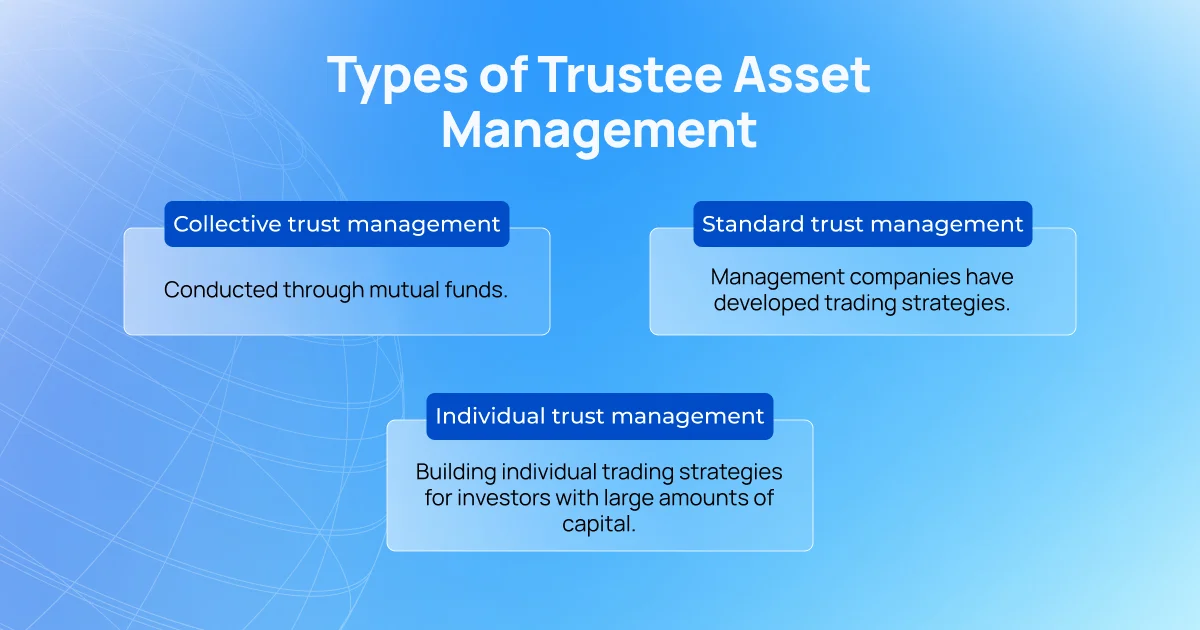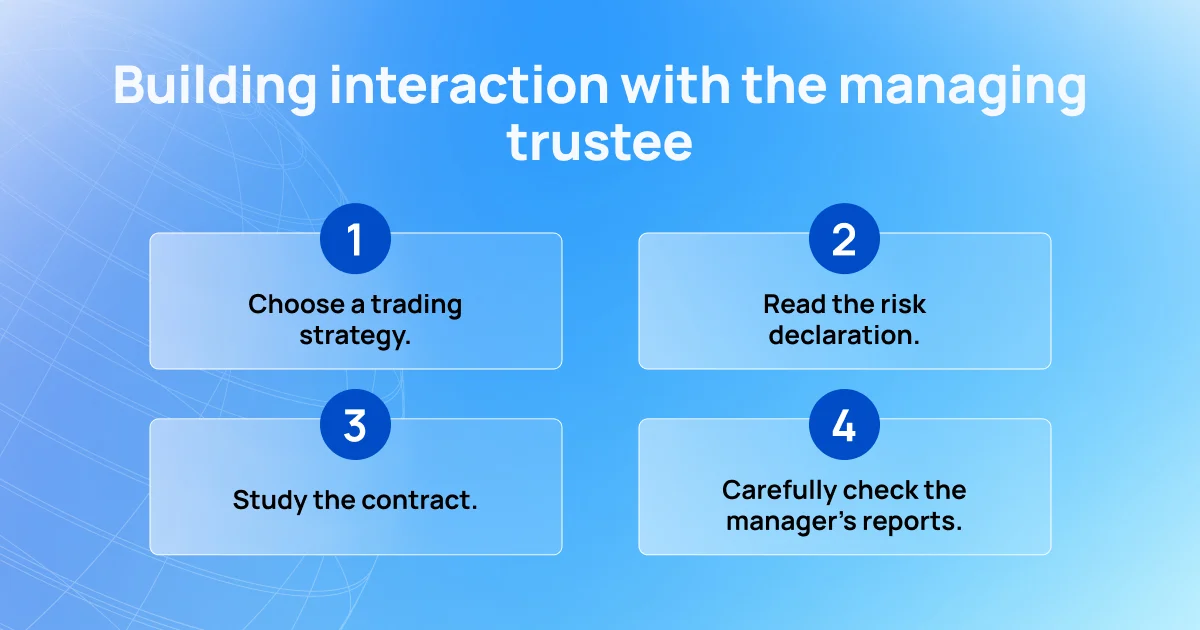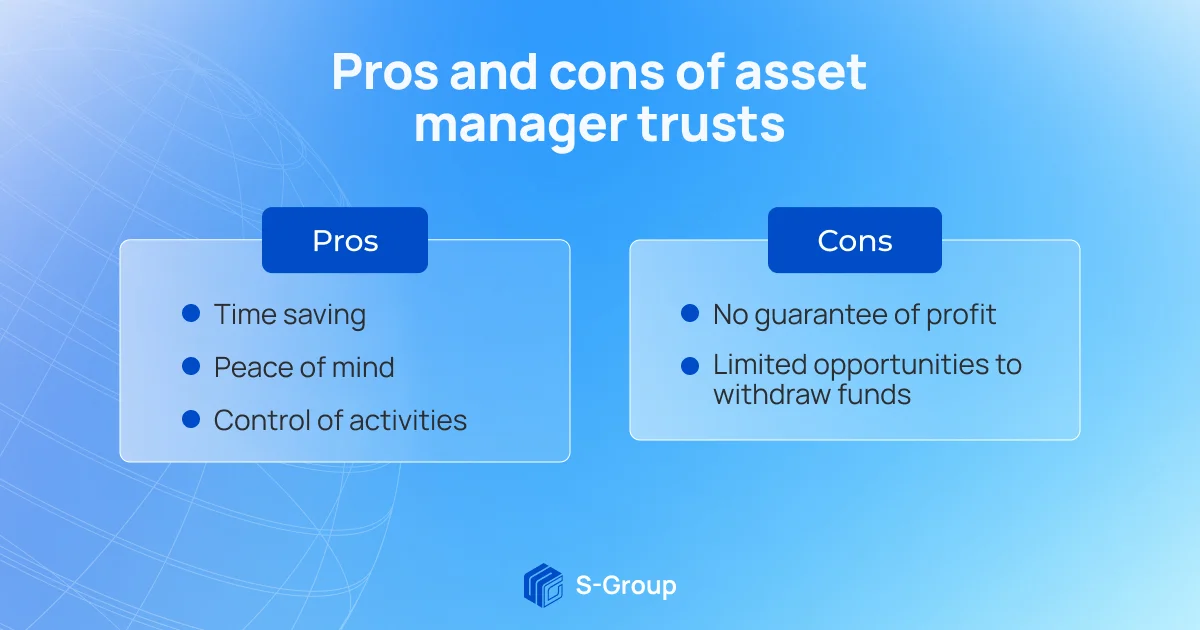What is a trust management asset?

A large number of investors prefer to entrust the management of their assets to a trustee. That is, an expert or team of experts who will manage the investor's assets so that they receive as much profit as possible.
In this article we explain what asset management is, its advantages and disadvantages, when it is needed, and how to choose a trustee.
Trust Asset Management: Definition
Trust Asset Management — is when an investor transfers the rights to manage his assets to a professional trustee who will create an investment strategy, buy or sell assets in time. That is, a trustee makes all transactions instead of the investor. Typically, the trustee is a company, a bank, or an investment platform. It is a compulsory requirement for organizations that provide trustee services to have a permit to operate.
The trust management is an agreement that is concluded between the trustee and the investor for a certain period of time. However, all rights of ownership of the assets remain with the investor. This distinguishes asset management from brokerage services, the contract with which often allows the broker to 'lend' clients money for their own transactions.
Managers charge a small fraction of the profits for their services. It is important to note that asset management does not guarantee the success of your trades, because you cannot guarantee anything with investments.
What is the point, then? Professional market participants understand exactly when to buy an asset, when to sell it, and when to keep it. In addition, a large number of novice investors have the status of unqualified investors, which prevents them from having access to many trading instruments. Management companies, on the other hand, have access to a large number of securities and trading instruments.
Who is suitable for asset management?
Asset management is most typically used by beginner investors who do not or cannot understand existing trading strategies, or who wish to create and diversify an investment portfolio. In this case, the asset management company itself chooses a suitable income strategy based on the initial investment amount.
Also, asset management is suitable for investors who have large sums of money and want to invest them effectively in assets in order to maximize income. This requires an individual investment strategy and professional portfolio management.
Types of asset management
There are three types of asset management: collective, standard and individual. Let us examine each of them in more detail.

Collective asset management
It is carried out by mutual funds. It means that a company gathers assets of several investors into one portfolio and manages them. This type of management is perfect for beginning investors because the entrance threshold can be as low as possible.
Standard Asset Management
Typically, asset management companies already have developed trading strategies. That is why they offer new investors the possibility to join one of them. Each developed strategy has a certain level of risk and objective.
In general, the standard trust is very similar to the collective trust, but has a higher entry level and, accordingly, a higher yield.
Individual Trust Management
This type of trust management is used by wealthy investors with large amounts of capital who require an individual approach to creating a strategy. In this case managers look individually at financial possibilities of the client, his expectations of profitability, acceptable risk level, and then a non-standard strategy is created. The commission for individual trust services is much higher than for the previous two types and may be up to 5% of the total amount of assets.
Interaction with Trustee
When building effective cooperation with a trust manager, experienced investors advise following the following algorithm.

1. Choose a trading strategy. Discuss in detail with your manager your expectations, the assets you would like to invest in and the returns you would like to obtain. Also, specify what losses you are prepared for and specify the investment time frame.
2. Read the Risk Disclosure Statement. The trustee must give you a document, which states the warnings about the possible risks and losses of investing. Read it carefully before you sign the contract.
3. Study the contract. Read the contract and the withdrawal conditions carefully. Some strategies require you to make an investment for a fixed period, for example for two years. In that case you need to find out what commission you will have to pay if you want to withdraw earlier.
4. Carefully check the manager's reports. You should monitor the trustee's work and periodically check the reports, in order to understand how your account is doing and the state of the investment portfolio. If you do not see the desired returns in your reports, discuss the matter with your trustee. It may make sense to review and adjust your strategy.
How do I choose a trustee?
The main criterion for selecting a trustee is the availability of a license, which grants you permission to conduct investment activities. Usually, companies post information about licenses and all supporting documents on their websites.
Apart from the license, experienced investors advise paying attention to the following parameters.
- Credit rating
It reflects the financial strength of the management company: the amount of capital, profit dynamics, debts, if any. The credit rating shows how the company manages its own funds, so the potential client will be able to guess how things will turn out with their money.
- Return to previous contracts
Read up on the earning capacity of the company's previous customers. Of course, past performance cannot guarantee future success, but you will be able to see statistics and do your own research.
- Commission amount
Find out what percentage the company wants to earn and compare those figures to your competitors. Too high commissions can only be justified if the company is generating far more profit for its clients.
Advantages and disadvantages of trusty asset management

+ Time saving. The investor does not need to understand the financial instruments, strategies, the market situation.
+ Peace of mind. Trusting the disposal of their assets to a manager, the investor is in a state of peace, as his assets are managed by a professional, so the risk of loss is much lower.
+ Control of activities. The investor can always request a report on the manager's activities and, if necessary, change the strategy.
- There is no guarantee of profit. No one can give a 100% guarantee of success in investments, because there is no guarantee that a security will yield the expected profit. Investments are always a risk, the higher the potential profitability of the strategy, the higher the risk of losing the deposit.
- Limited opportunities to withdraw funds. Many asset managers do not allow clients to withdraw funds early, and if they can, the client will have to pay a fee.
Key Findings
Trusty Asset Management is an effective tool that allows the investor to have the funds entrusted to professionals who will select the most suitable strategy for gaining profit. However, when choosing a trustee company it is important to pay attention to its credit rating, read the agreement carefully and familiarize yourself with the risks.
Share
Interesting
Would you like to receive a digest of articles?
One email with the best articles of the week.
Sign up so you don't miss anything.